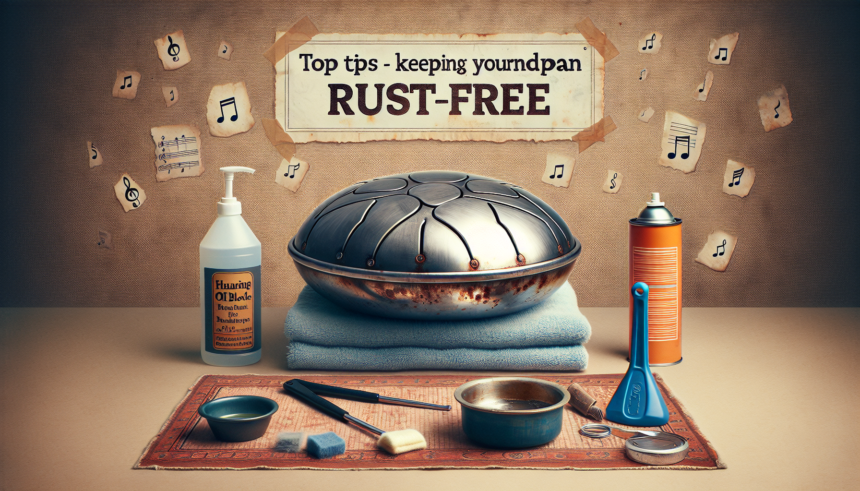The handpan is a captivating musical instrument that needs special care to maintain its sound quality and appearance. A significant concern for handpan owners is rust, which can damage the instrument if not properly addressed. In this article, we’ll explore the top tips for keeping your handpan rust-free, ensuring that it remains in excellent condition for years to come.
1. Understand Your Handpan’s Material
Handpans are typically made from nitrided steel or stainless steel. Nitrided steel handpans have a layer of nitrided material that provides some resistance to rust but still requires regular maintenance. Stainless steel handpans are less prone to rust but are not entirely rust-proof. Knowing your handpan’s material is the first step in implementing the right care strategies.
2. Regular Cleaning
Regular cleaning is essential for preventing rust on any handpan. After each playing session, use a soft, dry, and clean cloth to wipe off any sweat, oil, or dirt. This simple step can prevent moisture build-up, which contributes to rust development. For a more thorough cleaning, use a slightly damp cloth with mild soap, and ensure you dry the handpan completely afterward.
3. Use Protective Oil
Applying protective oil is one of the most effective ways to safeguard your handpan against rust. Products like Phoenix Handpan Oil, Frog Lube, or coconut oil create a protective barrier against moisture. To apply, put a small amount of oil on a soft cloth and rub it evenly over the surface of the handpan. Make sure to cover all areas, including the notes and the rim.
4. Store Properly
Proper storage is crucial in maintaining a rust-free handpan. Always store your handpan in a dry, cool place. Avoid leaving it in direct sunlight or near heat sources, which can cause condensation and promote rust. Consider investing in a handpan case or bag for added protection, especially if you are traveling with your instrument.
5. Control Humidity
Humidity is one of the primary causes of rust. To control humidity, use a dehumidifier in the room where you store your handpan. Additionally, silica gel packs can be placed in your handpan case to absorb excess moisture. Regularly check these packs and replace them as necessary.
6. Avoid Playing in Wet Conditions
While it may be tempting to play your handpan outdoors, especially in scenic locations, it’s best to avoid doing so in wet or humid conditions. Rain, mist, or even high humidity can accelerate rust formation. If you must play outdoors, ensure you wipe down and dry your handpan thoroughly afterward.
7. Use a Handpan Cover
A handpan cover can provide a layer of protection against dust and moisture when the instrument is not in use. These covers are typically made from breathable materials that allow air circulation while preventing moisture build-up. A good cover can be a worthwhile investment for the longevity of your handpan.
8. Avoid Touching with Bare Hands
The natural oils and sweat from your hands can contribute to rust development on your handpan. Whenever possible, wash and dry your hands before playing or consider wearing gloves. This practice reduces the transfer of moisture and oils to the instrument’s surface.
9. Inspect Regularly
Regular inspection of your handpan is essential to catch any signs of rust early. Look for discoloration, spots, or rough patches on the surface. If you notice any potential rust areas, address them immediately with a gentle cleaning and reapplication of protective oil.
10. Use Anti-Rust Products
There are various anti-rust sprays and products specifically designed for metal instruments like handpans. Products such as Corrosion-X or WD-40 can be applied sparingly to create a protective coat. Always follow the manufacturer’s instructions and use these products only as a preventive measure or a treatment at the first sign of rust.
11. Avoid Abrasive Materials
When cleaning or handling your handpan, avoid using abrasive materials that might scratch the surface. Scratches can become sites for rust to form. Stick to soft cloths and non-abrasive cleaners to maintain the integrity of the handpan’s surface.
12. Invest in a Regular Maintenance Routine
A consistent maintenance routine is the cornerstone of a rust-free handpan. Set a schedule for regular cleaning and oil application, such as once a month or after a particularly intensive playing session. Keeping up with maintenance prevents rust and keeps your handpan in top playing condition.
Conclusion
Maintaining your handpan requires a proactive approach, focusing on cleanliness, protection, and regular inspections. By understanding the material of your handpan and implementing these protective measures, you can enjoy your instrument for many years without the worry of rust. The effort you put into preserving your handpan’s condition will pay off in its longevity and sustained musical quality.
FAQs
- Q: How often should I apply oil to my handpan?
A: It depends on usage and environmental conditions, but generally, applying oil once a month is a good practice. If you play frequently or live in a humid area, consider applying it more often.
- Q: Can I use any type of oil for my handpan?
A: It’s best to use oils specifically recommended for handpans, such as Phoenix Handpan Oil, Frog Lube, or coconut oil. Avoid oils that can leave a sticky residue or attract dust.
- Q: What should I do if I find rust on my handpan?
A: If you discover rust, gently clean the affected area with a soft cloth and mild soap, dry it thoroughly, and apply a protective oil. For extensive rust, consult a professional for repair options.
- Q: Can I play my handpan in cold weather?
A: Cold weather itself is not a direct issue, but rapid temperature changes can cause condensation, leading to rust. Always warm up your handpan gradually and avoid playing in wet or freezing conditions.
- Q: Is it okay to store my handpan in its case all the time?
A: While a case is protective, it can trap moisture if not ventilated properly. Use silica gel packs inside the case and ensure it is stored in a dry, cool place.





